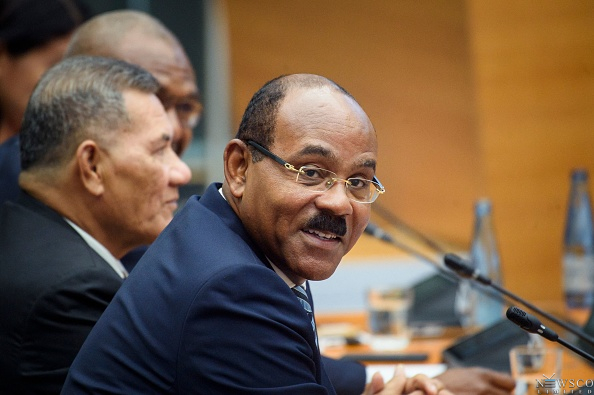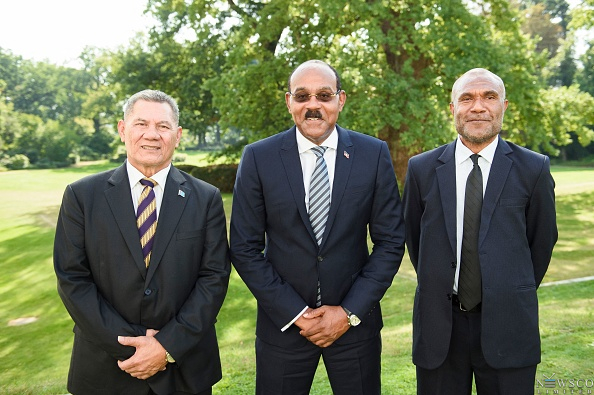
By Elesha George
On Tuesday, the International Tribunal for the Law of the Sea (ITLOS,) an independent judicial body established by the United Nations Convention on the Law of the Sea (UNCLOS), expanded the definition of marine pollution to include greenhouse gases.
Twenty-one (21) judges agreed that excessive production of greenhouse emissions is a marine pollutant and is harmful to marine and human life. The tribunal ruled that nations signed-on to the Sea Convention therefore have a legal obligation to prevent, reduce, and control marine pollution linked to greenhouse gas emissions which are largely absorbed by the ocean.
The first-of-its-kind decision was declared in Hamburg, Germany to clarify the specific obligations of States to protect the marine environment according to the interpretation and application of the 1970s Convention.
Championing the cause is prime minister of Antigua and Barbuda, Gaston Browne alongside the prime minister of Tuvalu, Kausea Natano who are both co-chairs of the Commission of Small Island States on Climate Change and International Law (COSIS).
It is a small victory for Small Island Developing States (SIDS) like Antigua and Barbuda which are affected by rising sea levels, coral bleaching, and ocean acidification. In 2022, Antigua and Barbuda became one of the first members along with Tuvalu and Palau to champion these concerns.
COSIS, who requested the advisory position, is now nine members strong. At the time of the filing of the Request, Antigua and Barbuda, Tuvalu, the Republic of Palau, Niue, the Republic of Vanuatu and Saint Lucia were parties to the COSIS Agreement. Subsequently, Saint Vincent and the Grenadines, Saint Christopher (Saint Kitts) and Nevis, and the Commonwealth of the Bahamas also joined it. All parties to the COSIS Agreement are also States Parties to the UNCLOS.
COSIS sought clarity on the duties of States in ocean warming, sea level rise, and ocean acidification, which are caused by anthropogenic greenhouse gas emissions.
Approximately 31 State parties to the Convention filed written statements to support their request for an opinion. Several more national leaders also supported their request for an advisory opinion from the oceans court.
“We have talked ourselves hoarse since the 1990s” – Gaston Browne, prime minister of Antigua and Barbuda
Caribbean countries and small island states which are among the most vulnerable nations to climate change have been agitating for financial and technical help for decades to mitigate the devastating impacts of climate change, all to little avail.
“It cannot be expected that our people remain silent as their homes are irretrievably destroyed,” remarked Browne, calling the request “an opening chapter” in the struggle to change the conduct of the international community.
Browne said SIDS leaders are not willing to resign their people to a “death sentence” which is exacerbated by the actions or rather inactions of developed nations. “Small island states may be the first to fall, through no fault of our own, but we will not be the last, for no country on earth can escape the deadly grasp of climate change,” he insisted.
“Just a few years. That’s all we have before the ocean consumes everything my people built across centuries” – prime minister of Tuvalu, Kausea Natano
With the island of Tuvalu projected to be among the first SIDS to become uninhabitable due to sea level rise, prime minister Natano warned too that no state is immune to the same fate.
“We, along with other small island States are on the frontlines of the battle against climate change, exhausted and without reinforcements. This reality is profoundly unfair, and it leaves small island States with no choice. We must unite and join forces to defend our very survival and existence, remaining silent is not an option,” he explained.
“Tuvalu is expected to be one of the first countries in the world to be completely lost to sea level- induced climate change. This could happen in the next two to three decades,” Natano said.
He added that already around 40% of his island’s capital is submerged under water at hightide. Even at the current pace of climate change, he said, in a matter of years, Funafuti would be inundated.

How greenhouse gas emissions work
Greenhouse gases trap heat in the Earth’s atmosphere, leading to higher global temperatures. A significant portion of this excess heat is absorbed by the oceans, raising sea surface temperatures.
Increasing temperatures then affect marine species and ecosystems, causing coral bleaching and the loss of breeding grounds for marine fish and mammals.
Rising temperatures also threaten food security, increases the prevalence of diseases, causes more extreme weather events and the loss of coastal protection which is significantly important to nations surrounded by water.
These countries do not have the financial or technical resources to mitigate this crisis, but contribute the least to its outcome.
What the Tribunal considered
The question asked essentially boiled down to whether greenhouse gas emissions are breaking the law of the sea, and whether States signed on the UNCLOS have an obligation to reduce those risks.
It’s important to note that the advisory opinion has “no binding force” according to the tribunal, but it can influence the international regulatory framework on climate change that can lead to the necessary changes to reduce deleterious impacts on oceans.
In its 153-page assessment, the tribunal came to several conclusions. Important among them were that they determined that anthropogenic green house gas emissions into the atmosphere fall under UNCLOS’ definition of “pollution of the marine environment”.
The terms “climate change”, “greenhouse gas emissions”, and “ocean acidification” do not appear in the 1970s Convention originally, so the tribunal therefore had to dissect various meanings of those terms.
As part of the obligations of States, it noted that while the Convention does not specifically outline a requirement to achieve the prevention, reduction and control of marine pollution, states are obligated to take all necessary measures to that end.
It said that “States Parties to the Convention have the specific obligations to take all necessary measures to prevent, reduce and control marine pollution from anthropogenic GHG emissions and to endeavour to harmonise their policies in this connection. Such measures should be determined objectively, taking into account, inter alia, the best available science and relevant international rules and standards contained in climate change treaties such as the UNFCCC and the Paris Agreement, in particular the global temperature goal of limiting the temperature increase to 1.5°C above pre-industrial levels, and the timeline for emission pathways to achieve that goal.”
Additionally, States Parties have the specific obligation to take all measures necessary to ensure that anthropogenic GHG emissions under their jurisdiction or control do not cause damage to other States and their environment, and that pollution from such emissions under their jurisdiction or control, does not spread beyond the areas where they exercise sovereign rights. “It is an obligation of due diligence,” the Tribunal remarked.
Firstly, it said States Parties are required to cooperate in formulating and elaborating rules, standards and recommended practices and procedures, consistent with the Convention and based on available scientific knowledge, to counter marine pollution from such emissions.
Second, States Parties are required to cooperate to promote studies, undertake scientific research, and encourage the exchange of information and data on marine pollution from anthropogenic GHG emissions, its pathways, risks, and remedies, including mitigation and adaptation measures.
Third, States Parties are required to establish appropriate scientific criteria based on which rules, standards and recommended practices and procedures are to be formulated and elaborated to counter marine pollution from such emissions.

